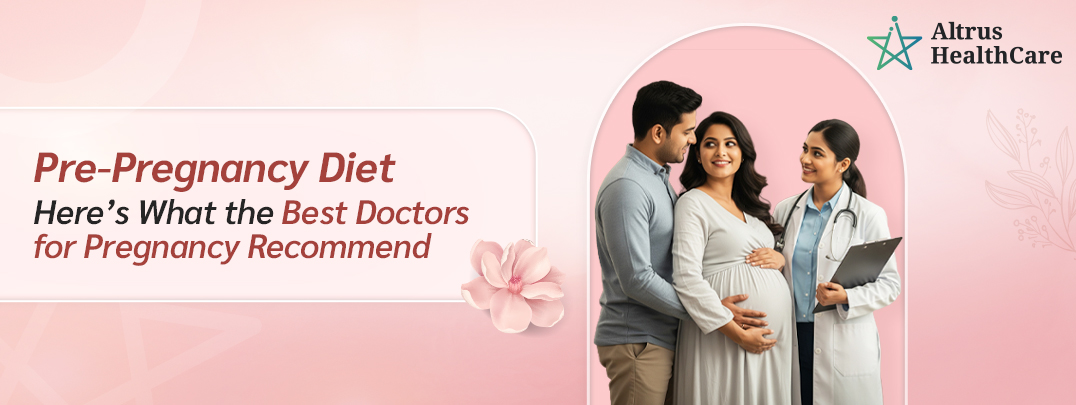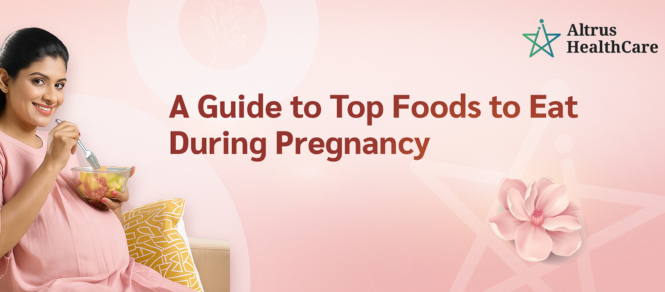If you’re planning to have a baby, it’s important to take care of your diet even before pregnancy. What you eat and the weight you gain during pregnancy matter. Not consuming a well-balanced and nutritious diet can have a negative impact on both you and your baby. That is why the best doctors for pregnancy at Altrus HealthCare recommend following a perfectly balanced diet before embarking on your journey of motherhood.
This blog will take you through a pre-pregnancy nutritional guide curated by our best doctors. Let’s dive in!
Understanding Pre-Pregnancy Nutrition
Simply put, nutrition is all about consuming the right food that allows your body to function optimally. To get the requisite nutrition before pregnancy, here are the top food items that you must add to your diet.
- Vegetables and Fruits
It is no surprise that vegetables and fruits are a great source of healthy fibres, vitamins, and minerals. Additionally, they prevent constipation issues and facilitate better digestion. However, make sure to add only the organic and fresh fruits and vegetables and avoid the canned ones. The best vegetables you can consume include carrots, peas, beans, and leafy greens. On the other hand, the fruits that you must add to your diet include berries, citrus fruits, and bananas.
- Proteins
When you are planning to conceive, the best doctor for pregnancy in Dehradun will recommend that you consume protein-rich food on a daily basis. Lean meat, poultry products, fish, eggs, and beans are among the top protein-rich food items you must consume. However, when adding poultry products to your diet, be sure to remove the skin and go for lean meat. Also, avoid the use of excess fat or oil while cooking them.
- Grains
Add as many whole grains as possible to your diet. Complex carbohydrates can help effectively regulate your blood sugar and insulin levels while maintaining optimal reproductive health.
- Oils
While you may think of avoiding oil completely, they are also a part of your nutritional diet. However, make sure to consume healthy fats only. A point to note here is that the exact amount you can consume daily will differ from individual to individual and depends on their nutritional assessment. As a matter of fact, you must try getting less than 10 per cent of daily calories from saturated fats and 10 per cent from polyunsaturated fats.
- Dairy Products
When it comes to a pre-pregnancy diet, you cannot leave behind dairy products. Food items like cheese, yoghurt, and milk are must-haves during the pre-pregnancy phase. They can provide you with the vital nutrients and calcium needed by your body for reproductive health. However, make it a point to go for low-fat dairy products like skimmed milk, reduced-fat cheese, and low-fat yoghurt. In case you are looking for dairy alternatives, you can select products like almond milk and soy milk. They are equally nutritious and can help meet the nutritional requirements of your body in the pre-pregnancy period.
Additional Nutrients to Consume
Besides the food products mentioned above, there are several other nutrients that must be consumed by women planning to conceive. Let’s explore!
- Iron
Women naturally tend to have lower iron levels, so it’s important to boost these levels when preparing for pregnancy. Including iron-rich foods in your diet, Greenleaf vegetables like peas, broccoli, turnips, beans, and organ meat like liver, pomegranate, lotus stem, jiggery, these all are rich sources of iron, can help support a healthier pregnancy journey.
- Folic Acid
Women who have reached the reproductive age must start consuming folic acid. Some of the excellent sources of folic acid are citrus fruits, dark leafy vegetables, nuts, and beans. Folic acid will not only meet the nutrient needs of your body but also help prevent neural tube defects.
- Calcium
According to the expert doctors at Altrus HealthCare, having healthy bones is undoubtedly essential during pregnancy. That is why you must start consuming calcium earlier. Be sure to add calcium-rich foods like milk to your diet.
Foods to Avoid
While there are many nutritious foods to include, certain items should be avoided due to potential risks:
- Raw or undercooked meat or eggs
- Unpasteurised milk or cheese
- High-mercury fish
- Raw seafood and sushi
- Processed junk foods
- Alcohol and caffeine
Wrapping Up
Embracing motherhood and welcoming a new life into the world comes with great responsibility, and it begins with taking care of your own health. That is why the best doctor for pregnancy recommends starting with a nutritious diet even before conception. Want to know more about the healthy food items and add them to your diet? The experts at Altrus HealthCare can help. We have the best doctor for pregnancy in Dehradun who can assist you throughout your pregnancy. From helpful advice to the right treatment options, our seasoned professionals are here for you, in every step of your journey!





